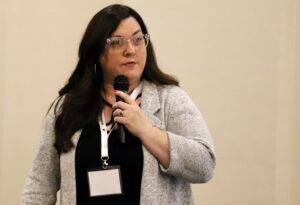Michelle La Fontaine educates attendees on pregnancy and infant loss
Trigger Warning: readers may be triggered by the subject matter of infant loss. To access a 24-hour National Crisis Line, call Hope for Wellness Help Line: 1-855-242-3310. Community Assistance Program (CAP) can be accessed for citizens of the Anishinabek Nation: 1-800-663-1142

By Jesse Johnson
NORTH BAY – Attendees of the 9th annual Anishinabek Nation Health Conference shed tears and learned a lot about pregnancy and infant loss from Michelle La Fontaine, Program Manager of the Sunnybrook Health Sciences Centre’s Pregnancy and Infant Loss (PAIL) Network, on Oct. 18 at the Best Western Hotel and Conference Centre in North Bay, Ont.
What is the PAIL Network?
The PAIL Network is peer-led support at no cost to any family in Ontario. They provide education for health care and service professionals and also raise awareness and advocate for families.
“We need to provide Indigenous support from Indigenous people for Indigenous people,” says La Fontaine.
The program supports first-trimester loss; second-trimester loss; third-trimester loss; infant/neonatal death; infant death due to SIDS/SUIDS; termination of pregnancy; and, elective abortion. Other groups and types of support are available for those who experience pregnancy after loss; parenting through loss; partners in grief; support for grandparents; and those trying to conceive. An Indigenous circle of support will be available online soon.
Pregnancy and infant loss in Indigenous Communities can occur due to issues with access to care, lack of resources and support, and, mistrust of the healthcare system.
“Some families are more scared of the healthcare system than they are of what’s happening with their own bodies,” La Fontaine says. “We have reached out to nearly 150 Indigenous Friendship Centres, communities, and healthcare professionals across the province… We learned that professionals and community members are looking for more education; culturally appropriate and informed support; online access to PAIL Network Support; and, want to form lasting and trusting relationships… “We’re looking at ways to have culturally appropriate and informed support and access to supports. Our support focuses on the grief needs of Indigenous families; recruiting and training Indigenous volunteers to facilitate online support groups; and providing the hardware to access online support.”
The PAIL Network has committed to act on Action 22 of the Truth and Reconciliation Act: We call upon those who can effect change within the Canadian healthcare system to recognize the value of Aboriginal healing practices and use them in the treatment of Aboriginal patients in collaboration with Aboriginal healers and Elders where requested by Aboriginal patients.
She shared an example of connecting, validating, and believing someone who is going through loss with a story from Lisa, “a nurse told me ‘I don’t know how you are feeling, but I can imagine and I’m right here with you.’ I’ll never forget someone acknowledging me and telling me they were right there with me.”
Before finishing her presentation, La Fontaine shared a quote from Elder Mae Louise Campbell.
“Birth is a sacred, intense, spiritual, and physical event that mirrors many of our Indigenous ceremonies. Placenta ceremony, belly button ceremony, rites of passage ceremonies, moss bag teachings, and umbilical cord pouch. Birth support goes beyond pregnancy, labour, and birth. Life must provide compassionate space for miscarriages and stillbirths. Traditional supports for a grieving parent include medicines, traditional funerals, letting-go ceremonies, sweats, naming ceremonies, and clan/society affiliations.”
For more information on the 9th annual Anishinabek Health Conference, visit www.anishinabek.ca.

